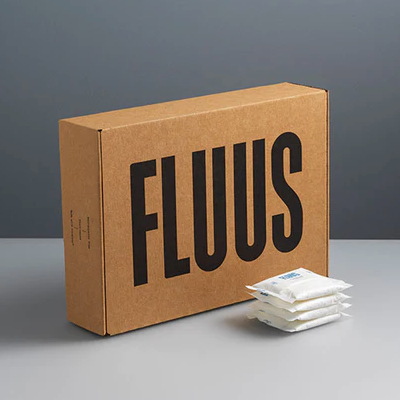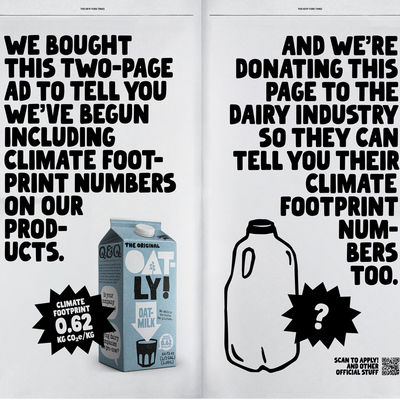19 : 05 : 23 : Weekly Debrief
This week: A new exhibition exploring the future of hot cities, flushable period pads, a new business venture for locals in Honduras, Oatly urges competitors to reveal their carbon footprint and Saint Laurent launches fine jewellery.
1. Vitra Design Museum’s new exhibition explores the future of hot cities
Germany – Vitra Design Museum’s new exhibition, Hot Cities, looks closely at the cities of the Arabic-speaking world and investigates the obstacles posed by the region’s harsh climate. Running until 5 November 2023, the exhibition aims to show how architects can blend traditional styles with modern technologies to tackle future challenges.
Hot Cities, curated by Ahmed and Rashid bin Shabib, presents case studies and examples from 20 Arabic-speaking cities that offer insights into climate change-related questions. The project demonstrates how these cities can thrive in extreme conditions through the adoption of appropriate urban culture. It invites experts to share their knowledge and to foster meaningful dialogue while inspiring fresh perspectives on the future of hot cities.
The show also seeks to create a dictionary of Arab architecture through the lens of climate adaptation. Hot Cities aligns with our Elastic Architecture report, in which we explored how environmental crises have resulted in architects designing adaptive buildings that meet the needs of communities and the planet.
2. Fluus introduces flushable period pads
UK – Fluus, a portmanteau word for flush us, has developed a game-changing line of microplastic-free, entirely biodegradable and flushable after-use period products.
According to Fluus, 30% of period products are flushed down the toilet in the UK, which leads to some 3.4 tonnes of microplastics ending up in waterways. The company set out to find a solution to tackle this overlooked issue and created a product that users can flush down the toilet without causing any environmental harm. The proprietary Flushtec technology provides pads with strong absorbent properties but also means the product breaks down into plant fibre and 100% biodegradable materials under water pressure when flushed.
The waste and plastic-free nature of Fluus sets it apart from most competitors by being kinder to the environment while users can avoid the inconvenient situation of finding themselves in a public toilet without a bin and a period product to dispose of. Women’s health is still massively underserved and under-researched, and small but incremental advances like Fluus’s technology are a step forward.
 Fluus, UK
Fluus, UK
3. Regal Springs turns miracle rain of fish into business venture for locals
Honduras – Sustainable fish farming firm Regal Springs and ad agency Ogilvy have joined forces with the residents of Yoru to catch hundreds of fish falling from the sky twice a year for 20–30 minutes. The phenomenon known as Lluvia de Peces, the rain of fish, is said to be due to tornado-like columns of air sucking up the fish from the ocean and slinging them onto Yoro.
Regal Springs identified a business opportunity given the number of free tilapia, snapper and bass raining on the city. In April 2023, the company announced a new programme remunerating residents for catching fish. The people of Yoru only earn about £0.80 ($1, €0.92) per day throughout the year, but Regal Springs is paying nearly £4.80 ($6, €5.50) per pound of fish caught and brought to the firm’s centre for cleaning.
The final product, called Heaven Fish, is wrapped in sustainable packaging made from local banana peel before being sent to more than 200 restaurant and grocery partners in Honduras. On top of the money earned by the fish contractors, 80% of the revenue Regal Springs generates from Heaven Fish goes directly to the people of Yoro.
In our Sustainability Series, we analysed how Post-purpose Brands and businesses can respond creatively to similar natural phenomena induced by global warming.
 Oatly, US
Oatly, US
4. Oatly urges competitors to reveal their carbon footprint
US – Oatly, the world’s largest oat drink company, has launched its Climate Footprint Challenge, calling on big dairy to reveal their products’ climate footprint. The new campaign offers big dairy companies free advertising (paid by Oatly) if they are willing to answer the same 68 questions Oatly had to answer to determine its own climate footprint. The ads will be featured in The New York Times, Los Angeles Times and The Washington Post, and on billboards in Times Square and Hollywood.
The campaign aims to advocate for transparency on the impact of products on the planet so consumers can make more informed choices. Oatly has also released data from a flash poll it conducted in the US on milk preferences that revealed that more than 54% of Gen Z and 49% of Millennials prefer plant-based milk to cow’s milk.
Oatly’s campaign strategy not only showcases its own concerted efforts on being sustainable – an important purchasing consideration for younger consumers – but advocates for accountability across the industry. This ties in with research from our Elastic Brands macrotrend that shows how consumers are no longer fazed by brand names, but instead are turning organisations inside out to seek transparency on their inner workings.
5. Saint Laurent launches fine jewellery line
Global – French luxury fashion house Saint Laurent has launched its first fine jewellery collection, Saint Laurent Haute Joaillerie. The line consists of bracelets, necklaces, earrings, rings and cuffs in gold and diamond. The entire collection is already available on the brand’s website and was introduced in selected flagship stores on 2 May 2023.
The series includes several timeless accessories crafted in precious metals and diamonds, all carefully selected by creative director Anthony Vaccarello, while the campaign images were shot by the German photographer Juergen Teller. The brand’s iconic motif, including the vertical Cassandre ‘YSL’, are incorporated into the line without compromising on the functionality of the pieces. Notably, every piece is made with recycled gold in line with Saint Laurent’s commitment to exploring eco-friendly alternatives to conventional materials.
Saint Laurent’s new line follows similar moves made by Prada, Gucci and Balmain in the past few years, indicating a growing appetite for the luxury jewellery market. It also reinforces the importance of developing sustainable jewellery as consumer demand for alternatives is growing, as discussed in our Regenerative Luxury Jewels microtrend report.
To future-proof your world, visit The Future Laboratory's forecasting platform LS:N Global for daily news, opinions, trends, sector specific insights, and strategic toolkits.
Want to read more?
Become a member today!
Sign up to one of our trends intelligence platform, LS:N Global and get unlimited access to a hive of insights - from microtrends and macro trends to market reports, daily news, research across eight industry sectors and much more.
Discover our memberships
Already a member? Click here to login
